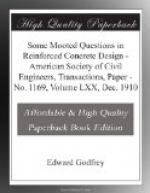The sixteenth indictment against common practice is in reference to flat slabs supported on four sides. Grashof’s formula for flat plates has no application to reinforced concrete slabs, because it is derived for a material strong in all directions and equally stressed. The strength of concrete in tension is almost nil, at least, it should be so considered. Poisson’s ratio, so prominent in Grashof’s formula, has no meaning whatever in steel reinforcement for a slab, because each rod must take tension only; and instead of a material equally stressed in all directions, there are generally sets of independent rods in only two directions. In a solution of the problem given by a high English authority, the slab is assumed to have a bending moment of equal intensity along its diagonal. It is quite absurd to assume an intensity of bending clear into the corner of a slab, and on the very support equal to that at its center. A method published by the writer some years ago has not been challenged. By this method strips are taken across the slab and the moment in them is found, considering the limitations of the several strips in deflection imposed by those running at right angles therewith. This method shows (as tests demonstrate) that when the slab is oblong, reinforcement in the long direction rapidly diminishes in usefulness. When the ratio is 1:1-1/2, reinforcement in the long direction is needless, since that in the short direction is required to take its full amount. In this way French and other regulations give false results, and fail to work out.
If the writer is wrong in any or all of the foregoing points, it should be easy to disprove his assertions. It would be better to do this than to ridicule or ignore them, and it would even be better than to issue reports, signed by authorities, which commend the practices herein condemned.
FOOTNOTES:
[Footnote A: Presented at the meeting of March 16th, 1910.]
[Footnote B: “Stresses in Reinforced Concrete Beams,” Journal, Am. Soc. Mech. Engrs., Mid-October, 1909.]
[Footnote C: Page 14, column 8.]
[Footnote D: Engineering News, December 3d, 1908.]
DISCUSSION
JOSEPH WRIGHT, M. AM. SOC. C. E. (by letter).—If, as is expected, Mr. Godfrey’s paper serves to attract attention to the glaring inconsistencies commonly practiced in reinforced concrete designs, and particularly to the careless detailing of such structures, he will have accomplished a valuable purpose, and will deserve the gratitude of the Profession.




